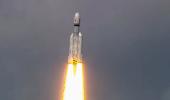The historic launch of India's third Moon mission, Chandrayaan-3 on-board LVM3-M4 rocket has given a major fillip to the country's first human spaceflight programme as the same launch vehicle with 'human rated' capability, would be used for the ambitious Gaganyaan mission.

The Bengaluru-headquartered Indian Space Research Organisation is busy working on its flagship project, Gaganyaan, which envisages the demonstration of human spaceflight capability by launching a crew of three members to an orbit of 400kms for 3 days and bring them back safely to earth, by landing in sea waters.
According to scientists at Satish Dhawan Space Centre, in Sriharikota, the 44.3 metre tall LVM3 rocket which carried the Chandrayaan-3 on July 14, would be the launch vehicle with 'human rated' capability.
The heavy lift launcher of ISRO, consists of three stages -- solid stage, liquid stage and cryogenic stage.
For the Gaganyaan programme, LVM3 rocket is re-configured to meet the human rating requirements and has been christened as 'Human Rated LVM3', ISRO said and it would be capable of launching the Orbital Module to an Low Earth Orbit of 400kms.
On Friday, the LVM3-rocket carrying Chandrayaan-spacecraft soared majestically and performed the operations as planned, officials said, indicating the reliability of the launch vehicle.
LVM3 is the heavy lift launch vehicle of ISRO for achieving a 4,000 kg spacecraft launching capability to the Geosynchronous Transfer Orbit.
The LVM3 rocket is a three-stage launch vehicle consisting of two solid propellant S200 strap-ons and core stages consisting of L110 liquid stage, C25 cryogenic stage.
ISRO Chairman S Somanath said the first abort mission for Gaganyaan would be conducted by the end of August.
The ISRO has planned to launch an unmanned mission to orbit by the end of next year.
The test vehicle is currently ready in Sriharikota and the scientists are engaged in the assembly work of the crew module and crew escape system.











 © 2025
© 2025